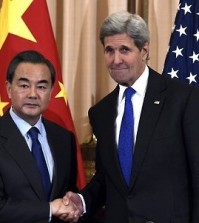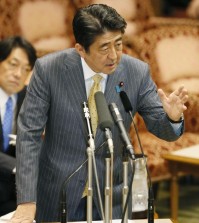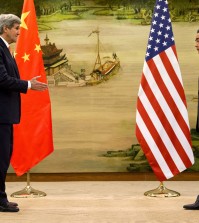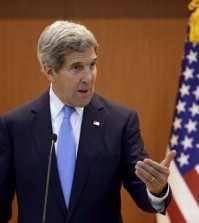- California Assembly OKs highest minimum wage in nation
- S. Korea unveils first graphic cigarette warnings
- US joins with South Korea, Japan in bid to deter North Korea
- LPGA golfer Chun In-gee finally back in action
- S. Korea won’t be top seed in final World Cup qualification round
- US men’s soccer misses 2nd straight Olympics
- US back on track in qualifying with 4-0 win over Guatemala
- High-intensity workout injuries spawn cottage industry
- CDC expands range of Zika mosquitoes into parts of Northeast
- Who knew? ‘The Walking Dead’ is helping families connect
Choose US
Top officials of Seoul, Japan to head to U.S. amid Abe provocations
By Kim Tae-gyu
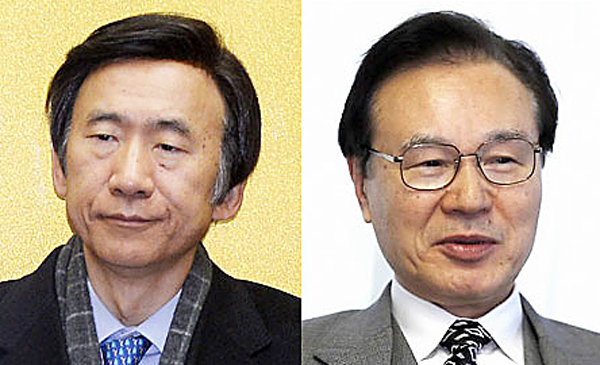
Korean Foreign Minister Yun Byung-se, left, and Japan’s security chief Shotaro Yachi. (Korea Times file)
Can the United States handle Asian sensitivities?
The answer will come when the U.S. hosts top officials from South Korea and Japan this month.
Senior officials of the two countries are scheduled to visit the U.S. to explain their positions to U.S. in regards to Japanese Prime Minister Shinzo Abe’s recent visit to the Yasukuni Shrine.
Foreign Minister Yun Byung-se plans to cross the Pacific next week to meet with U.S. Secretary of State John Kerry. He is expected to urge the U.S. to take a clearer stance against Japan’s provocative acts.
Shotaro Yachi, who took charge of the recently-established Japanese version of the U.S. National Security Council, will visit later in the month.
Adding to the delicate nature of the upcoming meetings is the fact that the U.S. needs the cooperation of Japan more than that of Korea in its planned “pivot” to Asia – which basically is a military re-balancing act aimed at checking the growth of China’s influence.
Tokyo knows it, as illustrated by Abe’s Yasukuni visit.
On the other hand, Washington may still not condone the Japanese prime minister’s actions, which have brought up old wounds of Asian nations hit by Japan’s colonial aggression.
“Both Seoul and Tokyo are desperate to win the support of Washington,” said Professor Shin Yul at Myongji University. ”The reaction of the U.S. will sway the scene in the ongoing standoff between Korea and Japan, which was sparked by Abe’s visit to the Yasukuni Shrine.”
Abe became the first sitting prime minister in seven years to visit the Tokyo-based temple, which honors 14 Class-A war criminals of World War II, angering not only Korea and China, the victims of imperialist Japan, but other countries as well. In particular, the U.S. issued a rare public criticism of Tokyo, saying it was “disappointed that Japan’s leadership has taken an action that will exacerbate tensions with Japan’s neighbors.”
In this climate, experts believe that Yun will attack Japan’s lack of contrition for its past misdeeds during his meeting with U.S. leaders; while Japan may try to use money as leverage.
“Japan may try to ‘bribe’ the U.S. to side with them, just as they did with the Futenma base late last month,” Professor Son Tae-gyu at Dankook University explained.
Gov. Hirokazu Nakaima of Okinawa recently gave a nod to the Defense Ministry’s application to reclaim land to relocate the U.S. Marine Corps base in Futenma.
Some observers said that Abe headed to the controversial shrine in the belief that the U.S. will not condemn his act because of his administration’s decision to favorably respond to an important U.S. request, which turned out to be a miscalculation of Washington’s reaction.
Meanwhile, a senior Cheong Wa Dae official mentioned that the Abe administration’s final goal is not to gain the backing of the U.S. but to negate the global order enforced by the U.S. after World War II.







